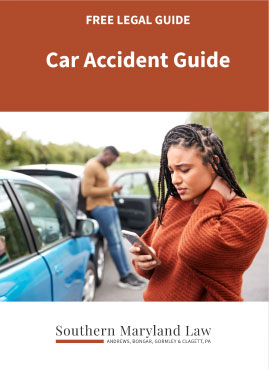A wrongful death case arises when a person dies due to the wrongful act of another. Maryland law defines “wrongful act” as “an act, neglect or default” which would have entitled the injured party to recover damages if they had not been killed. Wrongful death claims are civil actions made by the survivors of the deceased. Unlike criminal cases, civil actions don’t involve the threat of prison. Instead, they focus on seeking compensation for the survivors’ losses.
A wide range of situations can lead to a wrongful death claim, including but not limited to:
- Car Accidents – A loved one dying due to another driver’s negligence or recklessness can lead to a wrongful death claim. The responsible party is often another driver, parts manufacturer, or a government agency that failed to maintain safe road conditions.
- Medical Malpractice – Medical professionals have a duty of care to their patients, but they sometimes fail to meet this duty and cause someone’s death. Medical malpractice cases often involve surgical errors, misdiagnoses, or improper treatment.
- Workplace Accidents – Employers have a responsibility to ensure a safe working environment for their employees. If they fail to maintain safe working conditions or inadvertently create fatal accidents at the workplace, then they may be liable in a wrongful death claim.
- Product Liability – Virtually every manufacturer, distributor, and seller has a duty to ensure their products are safe. If your loved one died because of a defective product, then your wrongful death claim will likely target one of these groups.
There are many other kinds of wrongful death cases besides these common situations. A qualified wrongful death attorney can guide you through virtually every type of situation.
Who Can File a Wrongful Death Claim in Maryland?
Under Maryland’s wrongful death statute, the victim’s “primary beneficiaries” are eligible to seek financial compensation. This includes the victim’s parents, children, and spouse. If no primary beneficiaries are alive (or if the victim’s parents are disqualified from filing a claim—which is possible under certain limited circumstances), then “any person related to the deceased person by blood or marriage who was substantially dependent upon the deceased” can file a claim.
Importantly, Maryland’s wrongful death statute allows only a single lawsuit to be filed in relation to an individual’s death. As a result, it is important for all family members who are eligible to seek compensation to file their claims together. At Southern Maryland Law, we have extensive experience helping families meet the state’s statutory requirements, and our lawyers will ensure that your family’s claim is handled appropriately.
What Do I Have to Prove in a Wrongful Death Lawsuit?
It’s vital to remember that each wrongful death case is unique. Even simple cases require the touch of an experienced Waldorf wrongful death attorney who understands Maryland law. In addition, wrongful death lawyers in Waldorf, MD, can help you collect evidence, secure expert testimony, and calculate just compensation for your case. If you want to succeed in a Maryland wrongful death lawsuit, you need to prove several elements:
- Duty – The first element to prove in a wrongful death case is that the defendant had a duty of care or some kind of legal obligation towards the deceased. For example, a driver has a duty of care to drive safely and follow traffic rules to avoid causing harm to others.
- Breach – Next, you must prove that the defendant breached this duty of care. You can prove this element by showing the defendant did not act in a way that a reasonable person would have if they were in the same situation.
- Causation – The third element involves demonstrating that the defendant’s breach of duty directly caused the death of your loved one. Proving this element generally requires expert testimony indicating there was a connection between the defendant’s actions (or inaction) and your loved one’s death.
- Damages – To prove damages, you need to demonstrate that the death led to monetary losses that can be reimbursed. Some specific examples include medical expenses, funeral and burial costs, lost wages, loss of companionship, and emotional distress.
What Kinds of Compensation Can I Recover in a Wrongful Death Case?
Under Maryland law, there are several categories of damages available in a wrongful death. Each type is intended to compensate the surviving family members for their losses because of the death of their loved ones. Naturally, the types and amounts of damages can vary significantly depending on the circumstances of the case. However, there are three possible following types of compensation.
Economic Damages
Economic damages cover the financial losses that result directly from the death. These damages are intended to replace the economic contributions the deceased would have provided to their family and cover any costs associated with the death itself. Common examples of economic damages include:
- Medical expenses related to the deceased’s final illness or injury;
- Funeral and burial costs, which can be significant;
- Loss of the deceased’s expected future income, particularly if the individual was the primary breadwinner; and
- Loss of future benefits, such as retirement benefits, health insurance, or other financial support.
These types of damages are quantifiable, making it easier to present them in court with the help of financial experts.
Noneconomic Damages
Noneconomic damages aim to compensate for the intangible losses suffered by the surviving family members. These losses are harder to calculate but are no less significant. Examples of noneconomic damages include:
- Pain and suffering endured by the deceased before their passing;
- Loss of companionship, care, or guidance that the deceased provided to family members; and
- Mental anguish and emotional pain experienced by the surviving family.
These losses reflect the emotional and relational void left by the death of a loved one, which can have long-lasting effects on a family.
Punitive Damages
Punitive damages are not designed to compensate for specific losses but rather to punish the defendant for egregious behavior. In Maryland, punitive damages may be awarded if the defendant acted with actual malice—meaning they intentionally caused harm or showed a reckless disregard for the safety of others. However, punitive damages are rarely awarded in wrongful death cases because proving the defendant’s intent or malice is challenging under Maryland law.
Statutory Caps on Damages
It’s important to note that Maryland has statutory caps on noneconomic damages in wrongful death cases. These caps are adjusted annually, so the maximum amount that can be recovered changes over time.
Given the complexities surrounding damages in wrongful death cases, it’s essential to consult with a knowledgeable Waldorf wrongful death attorney. An experienced lawyer can help you understand what types of compensation may be available in your case, assess the full extent of your losses, and work to secure the maximum compensation allowed under Maryland law.
Understanding the Statute of Limitations for Wrongful Death Claims in Maryland
In Maryland, the statute of limitations for filing a wrongful death claim is a crucial factor that can affect your ability to seek justice and compensation for your loss. The statute of limitations refers to the time limit within which a lawsuit must be filed, and if this deadline is missed, the court may dismiss the case, leaving you and your family without legal recourse.
Applying the Wrongful Death Statute of Limitations
Under Maryland law, a wrongful death lawsuit must generally be filed within three years of the date of death. This time frame applies to most wrongful death claims, regardless of whether the death was caused by medical malpractice, car accident, or other negligent action.
Exceptions to the Statute
However, there are certain exceptions to this rule. For instance, if the wrongful death is caused by an occupational disease, such as mesothelioma due to asbestos exposure, Maryland law allows families to file a wrongful death lawsuit within ten years of the death or within three years of the date the cause of death was discovered, whichever comes first. This exception ensures that families dealing with long-latency diseases have an opportunity to pursue justice.
Understanding the Time Limits
Understanding these time limits is essential to protecting your right to compensation. If you’re unsure about whether your case falls within the statute of limitations, it’s important to consult with an experienced wrongful death attorney as soon as possible. They can help you navigate the legal process and ensure your claim is filed on time.
Working with a knowledgeable Waldorf wrongful death attorney ensures that your family’s rights are preserved and that you have the best chance of holding the responsible party accountable for their actions.
What Are the Grounds for Filing a Claim for Wrongful Death?
There are numerous potential grounds for pursuing a wrongful death claim in Waldorf. When we investigate your family’s claim, we will be looking for any and all evidence to suggest that someone else may be legally responsible for your loved one’s death. No matter what happened, and even if you are not completely sure what happened, we strongly encourage you to contact us so that we can help you make an informed decision about whether to pursue a claim for wrongful death.
Some examples of common grounds for pursuing wrongful death claims include:
- Car, truck, SUV, and motorcycle accidents;
- Commercial truck (i.e. 18-wheeler and tractor-trailer) accidents;
- Slip-and-fall accidents, trip-and-fall accidents, and falls from heights;
- Workplace accidents and illnesses;
- Medical malpractice;
- Nursing home abuse and neglect; and
- Criminal homicide.
In terms of who is liable for your loved one’s death, the answer will depend on the specific circumstances involved. For example, many fatal auto accident cases involve claims under the at-fault driver’s insurance policy. If the other driver was on the clock at the time of the accident, then his or her employer could be liable as well.
Likewise, in cases involving premises-related accidents, the owner of the premises, the tenant, and the construction company are just a few examples of several potential defendants. As your Waldorf wrongful death lawyers, we will use our experience to hold all liable parties accountable.
What Is Contributory Negligence in Maryland, and How Does It Affect Wrongful Death Claims?
In Maryland, contributory negligence is a legal doctrine that can significantly impact wrongful death claims. Under this rule, if the deceased person is found to have contributed to their death in any way—no matter how small—their family may be barred from recovering any damages.
This principle is outlined in the Maryland Code and remains one of the strictest contributory negligence laws in the country. Maryland is one of only a few states that still follow pure contributory negligence, meaning that if the decedent was even 1% at fault for the incident leading to their death, their family cannot recover compensation from the at-fault party.
Contributory Negligence Example
For example, if a pedestrian is killed in a traffic accident and the court finds that they were jaywalking or otherwise not exercising reasonable caution, the contributory negligence defense could be used by the defendant to avoid liability. Even if the driver was overwhelmingly at fault, the family’s claim could be denied if the deceased’s actions played a role in the accident.
How a Waldorf Wrongful Death Attorney Can Help
This doctrine presents a unique challenge in wrongful death cases, making working with an experienced attorney especially important. They can thoroughly investigate the circumstances surrounding the death, gather evidence, and build a case that minimizes the risk of contributory negligence being used to defeat the claim.
Given Maryland’s strict contributory negligence law, having skilled legal representation can make all the difference in achieving a fair outcome for the surviving family members. A qualified attorney will work diligently to ensure the victim’s family can secure compensation and hold the responsible party accountable.
















